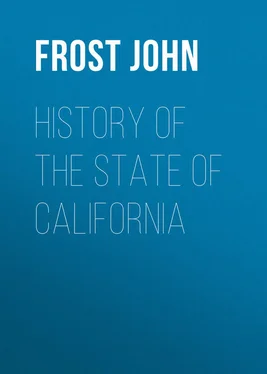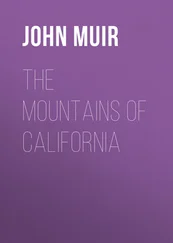John Frost - History of the State of California
Здесь есть возможность читать онлайн «John Frost - History of the State of California» — ознакомительный отрывок электронной книги совершенно бесплатно, а после прочтения отрывка купить полную версию. В некоторых случаях можно слушать аудио, скачать через торрент в формате fb2 и присутствует краткое содержание. Жанр: История, foreign_antique, foreign_prose, на английском языке. Описание произведения, (предисловие) а так же отзывы посетителей доступны на портале библиотеки ЛибКат.
- Название:History of the State of California
- Автор:
- Жанр:
- Год:неизвестен
- ISBN:нет данных
- Рейтинг книги:3 / 5. Голосов: 1
-
Избранное:Добавить в избранное
- Отзывы:
-
Ваша оценка:
- 60
- 1
- 2
- 3
- 4
- 5
History of the State of California: краткое содержание, описание и аннотация
Предлагаем к чтению аннотацию, описание, краткое содержание или предисловие (зависит от того, что написал сам автор книги «History of the State of California»). Если вы не нашли необходимую информацию о книге — напишите в комментариях, мы постараемся отыскать её.
History of the State of California — читать онлайн ознакомительный отрывок
Ниже представлен текст книги, разбитый по страницам. Система сохранения места последней прочитанной страницы, позволяет с удобством читать онлайн бесплатно книгу «History of the State of California», без необходимости каждый раз заново искать на чём Вы остановились. Поставьте закладку, и сможете в любой момент перейти на страницу, на которой закончили чтение.
Интервал:
Закладка:
"What surprises me," continued the Captain, "is, that this country should have been visited by so many scientific men, and that not one of them should have ever stumbled upon the treasures; that scores of keen eyed trappers should have crossed this valley in every direction, and tribes of Indians have dwelt in it for centuries, and yet that this gold should have never been discovered. I myself have passed the very spot above a hundred times during the last ten years, but was just as blind as the rest of them, so I must not wonder at the discovery not having been made earlier."
The plan of operations adopted by most of the miners who were not Indians or Californians, was to form bands of three, five or ten, under the command of one of the number, whose name the party took, and by which it was afterwards known. Some larger companies were formed in the United States, and repaired to California, and their operations were of course, on a more extensive scale; they having all the necessary equipments of gold-washers and miners. Written rules were generally drawn up for the government of the parties, varying in particulars according to the peculiar views of the framers. These rules provided for the modus operandi of procuring the gold, supplying the party with necessaries, attending to the sick, and the division of the fruits of their labor.
One of the most frequented placers of California is called the Stanislaus mine, situated near the Stanislaus River. It was one of the first places worked to any extent by the gold-seekers, but not satisfying the expectations of some of the most greedy, it has since been partially abandoned. A description of this mine, and of the living and operations of its workers in the winter of 1848-49, will give a good general idea of the toils and privations endured by the early gold-seekers in that region, and, also, of their mode of procuring the precious metal at most of the mines. We extract from a recently published work, distinguished for minuteness of detail and accuracy of description. 7 7 Personal Adventures in Upper and Lower California, by William Redmond Ryan.
"The mine was a deep ravine, embosomed amidst lofty hills, surmounted by, and covered with pine, and having, in the bottom itself, abundance of rock, mud, and sand. Halliday and I encamped at the very lowest part of the ravine, at a little distance from Don Emanuel's party; a steep rock which towered above our heads affording us shelter, and a huge, flat stone beneath our feet promising a fair substitute for a dry bed. Here then we stretched our macheers and blankets, and arranged our saddles and bags, so as to make ourselves as comfortable and warm as possible, although, in spite of our precautions and contrivances, and of a tolerably good fire, our encampment was bitterly cold, and we lay exposed to a heavy dew. We had given up our horses into the charge of the Indians, and I saw to their being safely placed in the cavallard , whilst Halliday went to chop wood; a task I was too weak to perform. I cannot say we slept; we might more correctly be said to have had a long and most uncomfortable doze, and when morning broke, we were shivering with cold, and shook the dew in a shower from our clothes. I consulted with my companion, and urged upon him the prudence of our setting to work to construct ourselves a sort of log cabin; otherwise I felt certain, from the experience of the past night, our sojourn at the mines would be likely to prove fatal to one or both of us. He was, however, far too eager to try his fortune at digging to listen to my proposal, at which he even smiled, probably at the bare idea of weather, privation, or toil, being able to affect his powerful frame. I saw him presently depart up the ravine, shouldering a pick, and glancing now and then at his knife, whilst I proceeded in search of materials for constructing a temporary place of shelter.
"As my strength was unequal to the task of felling timber, I endeavored to procure four poles, intending to sink them into the ground, and to stretch on the top of them a bed-tick I had reserved for the purpose. The contrivance was a sorry one at the best, but shelter was indispensable; and great was my disappointment – though I procured the timber after a painful search – to find that the rocks presented an insuperable obstacle to my employing it as I intended. My efforts to sink the poles proved utterly futile, and I was at last compelled to renounce the attempt in despair. I then packed up our goods into as close a compass as possible; and, having requested one of the Spaniards in Don Emanuel's party to keep watch over them, departed to explore the ravine.
"Within a few paces of our encampment there was a large area of ground, probably half a mile square, the surface of which consisted of dark soil and slate, and was indented with innumerable holes of every possible dimension, from six inches to as many feet or more, wide and deep. In all of these lay abundance of water, of which large quantities are to be found a little beneath the surface, the ravine being supplied with it in great abundance by the rains that pour down from the hills during the wet season. To the extreme right of our camp, the ground assumed a more rocky character; and, from the vast deposit of stagnant water, did not seem to offer many attractions to the miners. Yet there was scarcely a spot in any of these places where the crow-bar, the pick, or the jack-knife, had not been busy: evidence that the whole locality must have been extremely rich in the precious metal, or it would not have been so thoroughly worked.
"In crossing the ravine, I was obliged to leap from one mound of earth to another, to avoid plunging ancle-deep in mud and water. It was wholly deserted in this part, though formerly so much frequented; and, with the exception of a few traders, who, having taken up their station here when times were good, had not yet made arrangements for removing to a more productive place, not a soul was to be seen.
"I walked on until I reached the trading-post of Mr. Anderson, formerly our interpreter in the Lower Country, whom I felt delighted to meet with again. His shed was situated in one of the dampest parts of the mine, and consisted of a few upright poles, traversed by cross-pieces, and covered in with raw hides and leaves, but yet much exposed at the sides to the wind and the weather. He had a few barrels of flour and biscuit, which he retailed at two dollars a pound; for he made no difference between the price of the raw and the prepared material. The flour would go further, it was true; but then the biscuit required no cooking on the part of the miner, whose time was literally money, and whose interest therefore it was to economize it in every possible manner. He also sold unprepared coffee and sugar at six Yankee shillings a pound; dried beef at one dollar and a half; and pork, which was regarded as a great delicacy here, at two dollars for the same weight. The various articles of which his stock-in-trade consisted he had brought all the way from Monterey at considerable labor and expense; but, by the exercise of extraordinary tact, perseverance, and industry, he had succeeded in establishing a flourishing business.
"I discovered, however, that he possessed another resource – by which his gains were marvellously increased – in the services of seven or eight Indians, whom he kept constantly at work, in the rear of his shed, digging gold, and whose labor he remunerated with provisions, and occasional presents of articles of trifling value to him, but highly esteemed by the Indians. They were watched by an American overseer, who was employed by him, to assist in the general business, particularly in slaughtering; for, as beef was scarce, he used to send his man in quest of cows and oxen; which he killed, cut up, salted and dried, in his shed, and watching the most favorable moment for the operation – namely, when meat could not be procured at the 'diggins' – never failed to realize his own price for it.
Читать дальшеИнтервал:
Закладка:
Похожие книги на «History of the State of California»
Представляем Вашему вниманию похожие книги на «History of the State of California» списком для выбора. Мы отобрали схожую по названию и смыслу литературу в надежде предоставить читателям больше вариантов отыскать новые, интересные, ещё непрочитанные произведения.
Обсуждение, отзывы о книге «History of the State of California» и просто собственные мнения читателей. Оставьте ваши комментарии, напишите, что Вы думаете о произведении, его смысле или главных героях. Укажите что конкретно понравилось, а что нет, и почему Вы так считаете.












